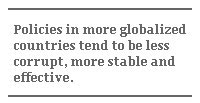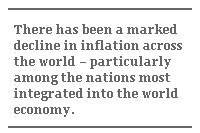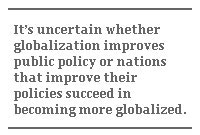Globalization’s Hidden Benefits
Globalization’s Hidden Benefits

DALLAS: How does globalization work? Citizens and companies do not seek to do business in faraway places for the sheer adventure of it. They do it because it makes them better off. This is the natural process of capitalism, constrained by the cost of transport and information and accelerated by technologies that make it cheaper to move goods, services and ideas. Globalization will proceed apace unless or until the governmental authorities intervene to stop it. Policymakers in both the political and monetary realms must come to grips with this if we are to fulfill our mandates.
A few numbers tell the story of the world’s march toward globalization:
• Trade as a percentage of gross world product has risen from 15 percent in 1986 to nearly 27 percent today.
• In the past two decades, the stock of foreign direct investment assets has nearly quadrupled as a percentage of gross world product.
• More people than ever are crossing national borders – for business and pleasure. On average around the globe, countries received just one foreign visitor for every 100 people in 1950. By the mid-1980s there were six, and since then that number has doubled to 12.
• Since 1991, international telephone traffic has more than tripled. The number of cell phone subscribers has grown from virtually zero to 1.8 billion – 30 percent of the world population – and Internet users will soon hit 1 billion.

Many analysts highlight globalization’s private-sector benefits – the strength built by competing as well as the gains from trade, specialization and productivity that come with expanding markets. But globalization offers less certainty for the public sector.
An essay in the 2005 annual report of the Dallas Federal Reserve Bank analyzes the interplay of globalization and public policy and points to a correlation between increasing globalization and measures that promote faster growth, lower inflation, higher incomes and greater economic freedom.
The economic logic is straightforward. Competition brings benefits to the public sector the same way it does for the private sector. Because factors of production are increasingly mobile in an era of globalization, governments vie to gain and hold onto them. Mobile factors flee economies that burden them with high taxes, excessive regulation and capricious administration. They gravitate toward countries that offer the best opportunities to increase profits or paychecks. The economic benefits of productive factors give nations incentives to pursue better economic policies.

The study relies on the globalization index devised by A.T. Kearney and “Foreign Policy” magazine, which ranks roughly 60 countries from the most to the least globalized. It includes cross-border trade and investment as well as measures for technologies that shrink the world, people-to-people connections and government participation in the global community. The US is the world’s fourth most globalized country, behind Singapore, Switzerland and Ireland. Iran comes in last.
We looked at how the countries in the A.T. Kearney/Foreign Policy index fared on 18 measures of public policy, from the World Bank, the Fraser Institute, the Heritage Foundation, Harvard University and Transparency International. Overall, as nations become more globalized, they tend to be more open to international trade, maintaining lower tariffs and reducing other barriers. They are more open to foreign capital, allowing foreigners to participate in their economies as direct and portfolio investors. Increasing globalization is associated with fewer and better-administered regulations, a more favorable corporate tax environment and policies that stimulate innovation.
In countries with a higher degree of globalization, policies tend to support more accountability in the private and public sectors. These nations are more likely to maintain courts that recognize property rights and enforce the rule of law. Their governments are more effective and less corrupt. Policies in these more globalized countries tend to be more stable, essential for long-term planning by business.
The study has implications for monetary policy. Inflation is the central banker’s nemesis – the Lex Luthor of the monetary realm. It cripples the poor and destroys the purchasing power of the elderly and others who live on fixed incomes. It erodes incentives to work and save and debases investment.

Today, money is probably the most mobile factor of production. In a nanosecond, it can scurry to any part of the world with a squeak of a computer mouse. Nations that fail to control inflation find they cannot retain their own capital or attract money from other countries, except at high interest rates. They end up not only with high inflation but also with lower investment, higher interest rates and slower growth.
Most countries want to avoid these outcomes. They want to retain capital and attract it from other countries. Low inflation helps them do so. Over the past 30 years, there has been a marked decline in inflation across the world – particularly among the nations most integrated into the world economy.
Not every government policy has improved with globalization. For example, the Federal Reserve study found no evidence of a link between increasing globalization and fiscal restraint. Governments tend to get bigger as nations become more interconnected to the world economy. Public transfers and subsidies increasingly pervade nations as they globalize, and personal income taxes become more burdensome as well. Globalization has less influence on fiscal policy, perhaps because richer nations have the means to spread those riches through their societies.
Likewise, labor market flexibility does not generally improve as economies open up to the rest of the world. As long as workers refuse to acknowledge they are competing in a global economy, they petition wealthy governments to protect their jobs. Labor market rigidities slow job growth and raise unemployment, in turn creating a greater demand for expensive safety nets for idle workers.

Recent demonstrations in France show the political difficulty of enacting even relatively modest changes in regulations that hamstring hiring and firing, raise costs and increase unemployment. The French government yielded to those protests – but it is encouraging that the French government recognized that restoring competitiveness requires loosening of the country’s labor laws. And not all French youths protested the law. As a business school graduate, Boris Mallereau, 27, had moved to London to find work. “Here, I might lose my job more easily, but I can find another job just as easily,” he said in a “Financial Times” article. “French people don’t realize that a robust job market is in itself a form of job protection.”
Other countries realize the value of nimble labor markets in an ever more connected world. They are beginning to enact reforms. Firms continue to seek the best workers for the money, wherever they may be found, especially as advances in telecommunications, transportation and supply-chain management bring the world closer together. Labor’s best option in a globalized world is to adapt, compete and get stronger.
With the important exceptions of fiscal and labor policies, the Dallas Fed study concludes that globalization is associated with better policies. Of course, there is a chicken-and-egg problem of whether globalization improves public policy or whether nations that improve their policies succeed in becoming more globalized. It is probably both. We should celebrate, not denigrate, globalization. It is associated with better government policies, ones that lead to higher living standards and greater economic freedom.
Richard W. Fisher is president and CEO of the Federal Reserve Bank of Dallas.